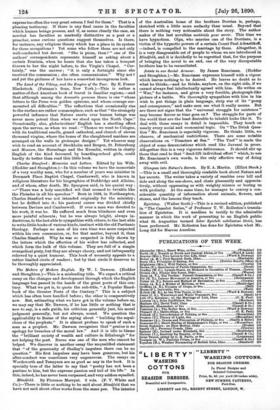The Makers of Modern English. By W. I. Dawson. (Hodder
and Stoughton.)—This is a misleading title. We expect a critical essay on the changes and development through which the English language has passed in the hands of the great poets of this cen- tury. What we get is, to quote the sub-title, " A Popular Hand- book of the Greater Poets of the Century." This is a subject which has often been handled before ; the other is comparatively new. But, estimating what we have got in the volume before us, we may say that Mr. Dawson, if he has little or nothing that is new to say, is a safe guide, his criticism generally just, his moral judgment generally, but not always, sound. We question the applicability to Burns of the saying about "building the sepul- chres of the prophets." It is almost profane to speak of such a man as a prophet. Mr. Dawson recognises that " genius is no apology for breaches of the moral law." And it is idle to blame the " brilliant society of wealth and culture in Edinburgh " for not helping the poet. Burns was one of the men who cannot be helped. We discover in another essay the unqualified statement that " of the generosity of Shelley's impulses there can be no question." His first impulses may have been generous, but his after-conduct was sometimes very ungenerous. The essays on Wordsworth and Tennyson are as good as any in the book. It is specially true of the latter to say that "poetry has not been a pastime to him, but the supreme passion and toil of his life." In this, indeed, he has never been surpassed, and very seldom equalled.


































 Previous page
Previous page